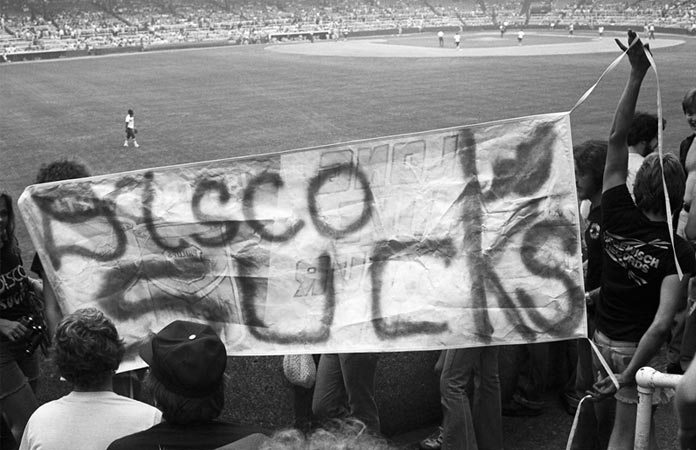Today In Pop Culture: Jive Talking, London Calling
Published on December 14th, 2015 in: Movies, Music, Today In Pop Culture |
Image from Disco Demolition Night in Chicago; July 12, 1979
Today is an important, nay, pivotal day in pop culture history because of two shocking and relevant events.
It’s 1977, and after weeks of hype and a pre-release radio blitz, the movie Saturday Night Fever opens to general critical acclaim and a public frenzy. Thanks to John Badham’s ode to disco and the people who dance that way, folks in Middle America and the flyover states had the power to do what the party people in New York were doing: paying too much for watered-down drinks, snorting coke, and dressing in white after Labor Day.
The soundtrack had been released exactly a month beforehand, and ended up selling over 15 million copies. It also inspired something called “disco fever,” which lasted approximately four years. Disco fever was a mental condition which infected middle-aged white men and women, leading them to believe that pointing to the ceiling and then pointing down at the floor was “dancing” and could potentially get them “laid.”
Disco music popularized the high falsetto harmonies of Australian band the Bee Gees, who went from being a mildly psychedelic band singing about mining accidents to the Kings of Disco. They were inescapable. The soundtrack album stayed at number one on the US charts for six straight months. They released six singles from the thing! It was like music for conditioning, some kind of horrible heterogenous airborne virus that made all the adults in the USA start line dancing and drinking things like Singapore Slings and Mai-Tais.
But, like any time there’s a movement that reeks of fascism, there’s an underground that will rise to combat it.
On this day in 1979, The Clash’s album, London Calling, was released and, like some wonderful sonic bug spray, it killed disco to death.
The Clash—four snarling, angry British kids—burst onto the scene and took on the establishment in a way that the Sex Pistols could only dream of. The Clash had lyrical literacy, and fused a wide variety of styles. While the Pistols crowed about anarchy in the UK, the Clash was writing about the Spanish Civil War and growing civil unrest in the African and Caribbean communities living in Brixton.
The Clash were relevant. They didn’t spit out tropes and hope for nothing but the royalty checks. The Clash were aware and prescient, and they wrote songs that stirred people to action. They were the social prophets of the punk movement, and love them or hate them, you can’t take that away from them.
Oh, and this has nothing to do with the date, and it’s only tangentially related, but Happy Monday. Here’s the Smiths.
https://www.youtube.com/watch?v=nvbCu49lH2Q
Time limit is exhausted. Please reload the CAPTCHA.